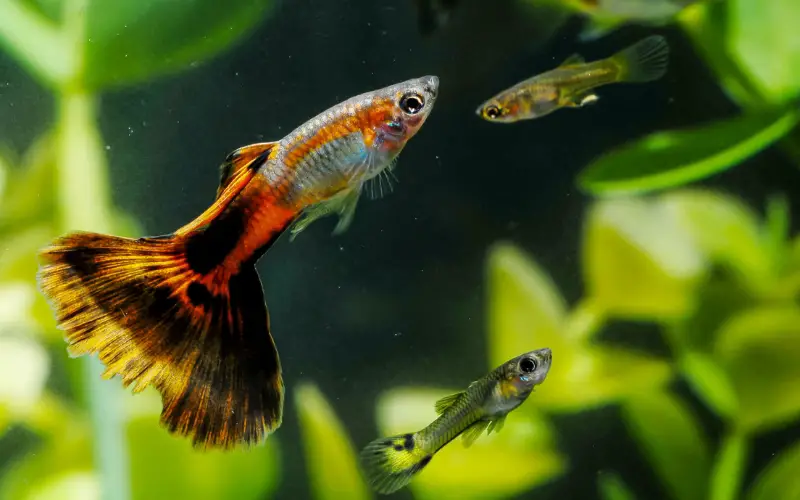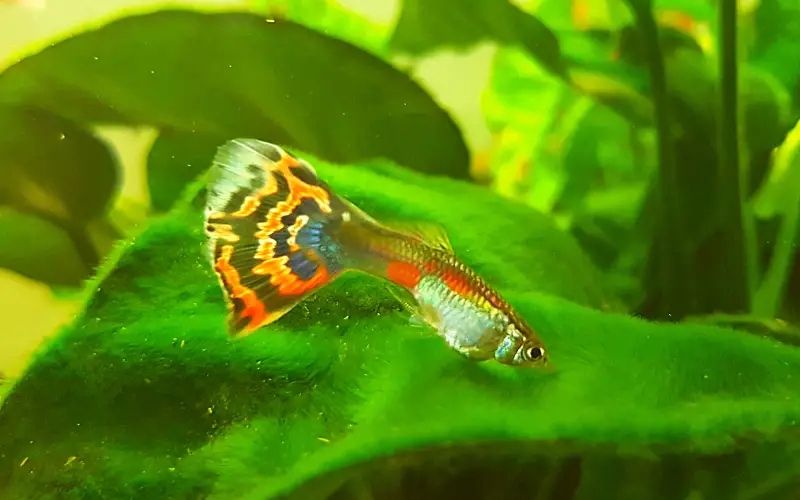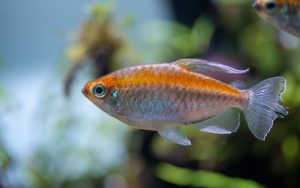Are you passionate about Lifespan Guppy and want to achieve the longest possible life for your pet fish? You’re in luck!
This blog post will discuss how maintenance and care for guppy friends can increase your guppy lifespan tenfold.
We’ll cover topics such as water quality, what kind of food to feed your Guppy, tank size, temperature settings, and tips on preventing common diseases that may affect a guppy’s health.
By following these easy steps, you’ll be able to ensure that your beloved Guppy is living its very best life far into the future.

So fish keepers, read on to learn more about providing the ideal environment for maximum lifespan for your little scaly friends today!
Table of Contents
ToggleHow Long Do Guppies Live in a Tank?
How long do guppies live in captivity? The lifespan of guppies in a tank will depend on how well you take care of them. Guppies typically have an average guppy fish life span of 1-3 years when kept in a tank, provided the tank is well maintained.
Water temperature should remain at 25-29oC, and water quality must be checked regularly to keep nitrates and other chemicals safe.

Other factors, such as overcrowding in the tank or insufficient food supply, can reduce their life expectancy significantly. Additional care requirements such as regular water changes and proper nutrition are important for maintaining good health and lengthening the life span of guppy fish.
NOTE: The mortality rate of male and female guppies is remarkably high at 60-70% within the initial two weeks of their lives. Being tiny creatures, guppies are prone to predators and cannibalism.
How Long Do Feeder Guppies Live?
Feeder guppies have an average life span of 2-5 years, depending on the environment they are kept in. Proper care and a clean habitat can help extend your guppy fish’s life span.
Guppies require regular tank maintenance and good water quality to thrive and stay healthy throughout their lifespan. Additionally, they should receive plenty of nutrition from high-quality flake, mosquito larvae, baby brine shrimp, or pellet fish food designed specifically for wild guppies.
Life Span of Guppy Koi
Koi Guppies, characterized by their unique patterns and colors, can live up to 1-5 years when properly cared for. Koi guppies require the same care as regular guppies but need additional attention to their unique coloring and markings to maintain a healthy fish appearance.
To increase the lifespan of your Koi guppy, it is important to keep their tank clean and provide them with a balanced diet. Additionally, it is important to avoid overcrowding their tank to prevent stressful tank conditions that can lead to premature death.
Fantail Guppy Fish Lifespan
The average lifespan of the Fantail Guppy is between 2-3 years. Like other varieties, proper care for Guppy and maintaining their environment is essential for ensuring a long and healthy life. Fantail guppies need plenty of clean, oxygenated water and a balanced diet.
It is also important to note that overcrowding their tank or exposing them to stressful conditions can reduce their lifespan significantly. Additionally, they should be given plenty of rest in the tank to avoid exhaustion and stress.
Female or Male Guppies – Which Live Longer?
Despite extensive research, I could not find evidence to support the claim that female guppies live longer or vice versa. However, from my experience, both genders tend to live longer when kept separately.
If female guppies are constantly bearing young, their lifespan may be shorter. Similarly, if male guppies mate too frequently, they may have a shorter lifespan.
Overall, while gender may not determine guppy longevity, environmental factors such as breeding habits can play a significant role.
5 Factors that Affect the Lifespan Guppy Fish
Many things affect a young guppie’s lifespan. They all have control but not everyone. List some of the factors that affect the lifespan of your guppies:
Guppies Diet:
The diet of your Guppy plays a big role in determining its potential lifespan. Feeding them a balanced diet high in proteins and vitamins and avoiding overfeeding will ensure they receive the proper nutrition needed to stay healthy and live longer.
Water Quality:
The water quality in the tank is essential for guppies’ health and
Guppies Genetics
Nobody is of a cheating nature, excluding guppies. A major predictor of the longevity of guppy genitalia is their genetics. You cannot control guppies’ genetics. Usually, guppies with weak genes die before they reach adulthood.
Buying guppies from professional guppies breeding companies breeding healthy guppies with a good gene profile can increase this peaceful fish lifespan. Although the store generally sells quality seafood, pet shops are a trusted source for buying dogs for long lifespans.
Guppy Fish Tank Size
The guppy fish size is 1.6 inches, and the female guppies are 2.5 inches. Guppies need ample floor space for movement, although small. Keeping dozens of Guppies is your priority. Remember that every adult guppy has around 1 gallon of water for a good idea of how much room it needs.
For example, we would need 20-gallon tanks if we had seven guppies. I recommend using 10-gallon tanks if we start to guzzle. This size tank is compatible with most aquariums and allows for up to 4-5 guppies.
Cohabiting With Other Aggressive Fish
It would help if you considered the guppie tanks you use as pets for good health. It can be stressful to keep puppets in the pool. You can keep the animals in an environment where you can be calm and avoid snarling the birds.
It would be best to introduce other tropical freshwater fish, such as tetras, barbs, and mollies, with the guppies. These tropical fish species will not harm the guppies and can benefit their health.
Avoid adding aggressive fish such as goldfish, betta fish, angelfish, or cichlids to the same tank as guppies. This is because they tend to attack guppies and can cause serious injury or death.
How to Improve Lifespan guppy Longevity? (Guppies for Beginners)
The following is my list of tips for improving life expectancy and longevity – those I have practiced for many years.
9 Tips for Increasing the Lifespan of a Guppy Fish
Since guppies typically live quite a long time, we can only guarantee that a fish will live all of its lives (up to 5 years). This factor ensures guppy longevity for many years to come.
You can increase your guppies’ lifespans by giving them the right environment and care. Here are 9 tips that can help you:
Feeding Quality Food to Your Guppies
In addition to the proper genetics, guppies need high-quality meals to survive long. I’ve posted an article on Guppy Food here. Please see that article. Guppy fish can consume almost everything they’re given. The kids are fed both homemade and commercial food products.
It would help if you gave them a varied diet. When feeding commercial food, use an approved brand. You can purchase various live food online, including vegetable pallets.
Observe Their Swimming Behavior
Guppies need active activity and swimming regularly. However, this could signal health problems when one has lethargy or swimming difficulties. Observing the behavior can help identify underlying health issues that should be addressed.
Water Changes and Maintenance
Regular water changes are essential for preventing diseases and keeping the tank clean. The water should be changed weekly, with about 10-15% of the total tank volume being replaced each time. This ensures that the water remains clean and free from toxins, which can build up over time.
Reducing Stress
As humans, Guppies may suffer from stress. There are several reasons for stress in guppy fish. What can be stressful for guppies if they are kept in community tanks? The Angelfish and Tiger Bar are very dangerous to fish. I never recommend keeping them together with the Guppies since guppy fish can cause gastrointestinal issues and contaminate the fish.
Poor tank conditions like low and too-high temperatures and changes in water chemistry may cause stress in the guppies.
Try to create favorable conditions for your child so you don’t experience problems simultaneously. When there is no fear, the guppies do not hide.
Avoid Over-Guppy Breeding
Overbreeding can result from causing excessive strain in females and result in illness as well as shorter guppy lifespan. Alternatively, consider introducing a breeding schedule to prevent overbreeding.
It is recommended that male-to-female ratios in tanks should range from two to three females. You can separate them as you observe overbreeding.
Giving the Right Water Parameters
Water parameters have become very important factors in our guppie health in general. Guppy fish is extremely tough but can support several water parameters.
What are Good Water Conditions for Guppy Fish? Ensure that your tap water is safe. Tap water has high amounts of heavy metals, chloramines, and other contaminants safe for people but can be very harmful to the fishes.
Use water conditioning when changing tap water. Seachem Prime removes toxic elements and pollutants from water.
Select Tank Mates Carefully
You need to consider your female or male guppies gender and your personality. Avoid predators or aggressive animals – including cichlids or larger fish – who can attack or consume the doggie.
Instead, consider peaceful, hardy fish such as Tetra, Danidio, and Corydoras, which have comparable sizes and temperaments. Tank mates must also be determined according to compatibility.
Observe Your Guppies Regularly
Spend your days watching your guppies daily to see their behavior and looks. Seek out behavior that might signal a problem. When something seems off, contact your veterinarian and make the necessary changes.
Also, Look For Signs Of Disease
The first sign of disease in guppies is listlessness or a lack of appetite. Some common diseases include bacterial infections, parasites, and fungal issues. If your puppy shows any signs of disease, seek medical care as soon as possible.
How Many Guppies Must Be Kept Together?
How many guppies should be kept together? One Guppy per 2-3 gallons of water is a good rule of thumb. The ideal ratio of guppies in a tank is two or three females to every male.
This will reduce the chances of aggressive behavior between the guppies and help ensure they can thrive.

Additionally, providing plenty of hiding spaces, like caves and rocks, will be beneficial so that they can retreat from other fish when needed. It’s also important to ensure that your tank isn’t overcrowded, as this can cause stress for all guppies.
How Many Guppies Can You Have in a 10-gallon Tank?
Generally, you can fit 5-6 guppies in a 10-gallon tank. However, this number could vary depending on the fish’s size and health. It is important to watch for signs of overcrowding, such as increased aggression among fish or difficulty swimming.
Additionally, having more than six guppies may require more frequent water changes due to the amount of waste they produce – which could be detrimental to their health and yours!
Are Guppies Ok in Hard Water?
Yes, guppies are perfectly fine in hard water! Although they prefer habitats with a slightly more acidic pH of 7.0 or greater, they can survive and thrive in hard water.
Harder water is more microscopically-textured than soft water, which has a soothing impact on the environment for your Guppy’s fins and skin.
In addition to this added protection from pollutants like chlorine and other minerals found in drinking faucets or tap water, it also helps maintain their nutrients when fed flakes meant specifically for aquarium fish.
If you want to keep guppies healthy, the best way to ensure this is by creating an environment that mimics their natural habitat as closely as possible; Hard Water should be part of that equation!
How Often Do Guppies Have Babies?
Guppy fish breeding time can vary depending on the temperature and other environmental factors but typically occurs every 28-35 days. Female guppies can produce anywhere from 20-100 guppy fry during this time.
Providing plenty of cover and hiding spaces is important to help newborn guppies survive and thrive. It is also important to keep up with regular water changes to ensure that the tank stays clean and toxins-free.
Keeping the tank clean is essential to your guppies’ well-being, as it will help them stay healthy and provide a safe environment for them to live in. By providing optimal space, food, and water conditions, you can help your guppies live happy and healthy lives!
It is important to remember that guppies are social creatures and should be kept in groups. This will help them feel safe and secure, allowing them to thrive and produce healthy fry for years.
How Long Do Guppies Stay Pregnant?
How long guppies will stay pregnant? The average pregnancy duration for guppies typically lasts between 21–30 days. When the female Guppy is pregnant, her gravid spot will darken, and its size can expand significantly.
As the pregnancy progresses, you may also observe that she has a ‘pineapple shape’ due to increased fluid around her abdomen. During this period, providing enough nutrition for her to produce healthy fry when giving birth is essential.
The gestation period of a guppy can be affected by various factors such as temperature, water quality, and stress levels. It is important to ensure that your tank is set up correctly and provides an optimal environment to help your guppies breed successfully.
Conclusion
To conclude, this article has discussed the special steps you can take to help improve the lifespan of guppies. Research indicates that these few simple changes can increase the average expectancy of your Guppy from two years to ten-plus, meaning with proper attention and observation, you can avoid some heartbreaking early departures.
Maintaining a healthy water temperature, providing plenty of oxygen, and ensuring appropriate food consumption are primary means for increasing the Guppy’s lifespan. Furthermore, you now better understand why your tank must stay within capacity. You can never stop learning as a fish keeper, so stay up-to-date with information! If you invest time into regular tank maintenance and observe any changes in your fish’s behavior, you should rest easy knowing that you have done all you can to increase your Guppy’s life expectancy.
You might also like
- What Does Guppy Fish Eat: 5 Fun & Creative Guppy Diet Ideas
- How Long Does Guppy Fish Live: 7 Tips to Prolong Their Life
- How Big Do Guppies Get: A Comprehensive (Beginner’s Guide)
- Does Guppies Need Fish Tank Heater: A Comprehensive Guide
- Do Guppies Lay Eggs or Give Birth? (A Comprehensive Guide)
- How Many Guppies Should be in a 3 Gallon Tank? (Comprehensive Guide)
- Koi Guppies Price, Size, and Different Types (Solved & Explained)




